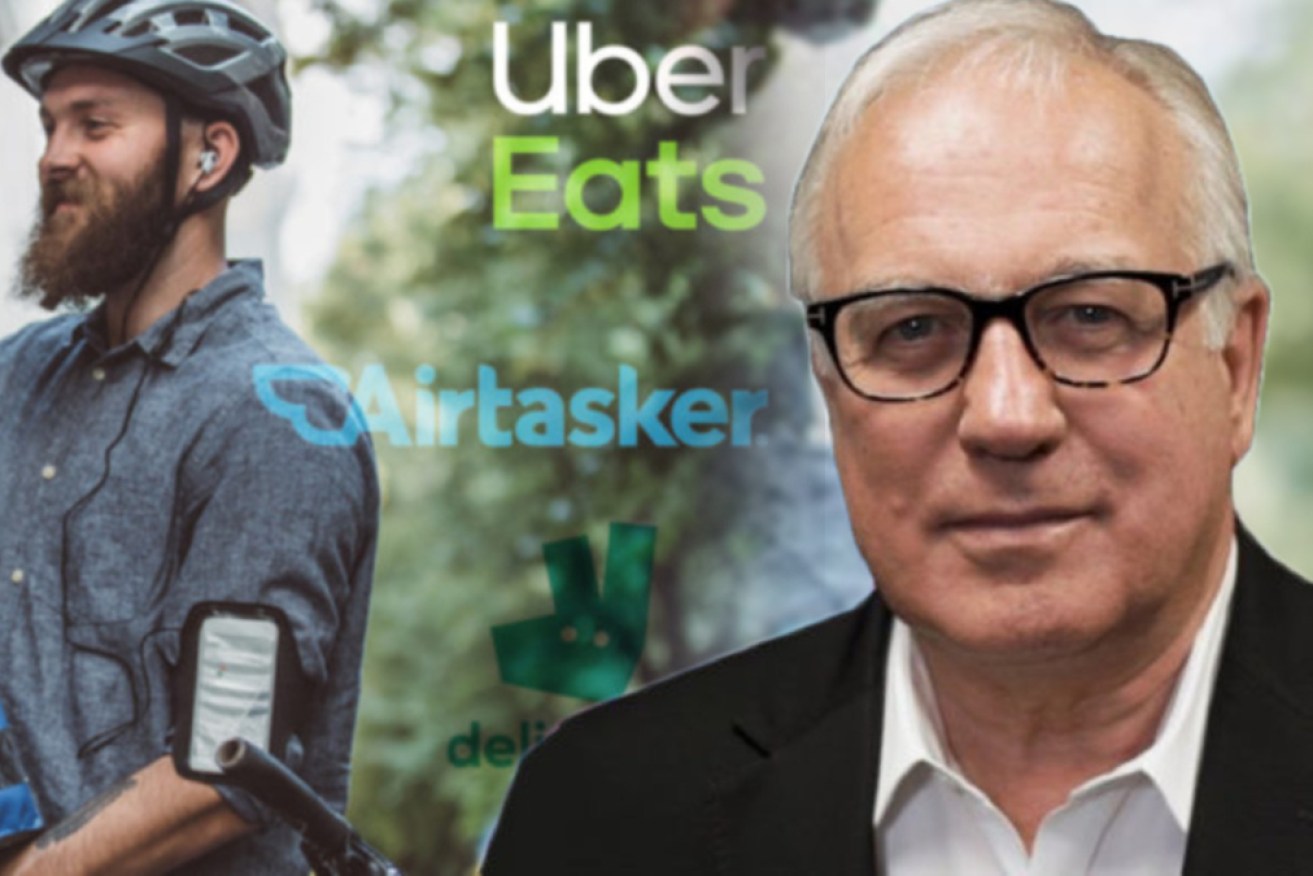Alan Kohler: Deliveroo judgment could be one for the ages for workers’ rights


The Deliveroo judgment has echoes of 1907 for workers rights in the gig economy, Alan Kohler says. Photo: TND
Last week’s Fair Work Commission judgment in Diego Franco v Deliveroo could be as important for our time as the Harvester judgment was in 1907.
It’s also an echo of the Great Shearers’ Strike of 1891, when independent contractors first got organised and, in the process, founded the Labor Party.
But it makes you wonder why these battles have to be refought again and again.
Commissioner Ian Cambridge found that under Common Law, Diego Franco, a Brazilian national who arrived here on Christmas Day 2016, was an employee of Deliveroo, not an independent contractor as the firm asserted.
He was therefore subject to unfair dismissal rules and had been unfairly dismissed, as he and the Transport Workers Union claimed.
The TWU used it as a test case for bringing gig economy contractors into the award system.
So far so good on that score, although Deliveroo says it will appeal.
It’s part of a global effort by unions and labour regulators to force gig economy businesses, especially ride share and food delivery ones like Uber and Deliveroo, to treat their drivers as employees not contractors, and therefore pay them minimum wages and give them award conditions.
Spain is the only country so far to legislate, with Labour Minister Yolanda Diaz saying the gig economy law puts Spain “at the forefront of a technological change that cannot leave labour rights behind”.
California passed a law called AB5 in 2019, which entitles contractors to be classified as employees, except there were 100 professions exempted from it, and the California Trucking Association drove a truck through it, so it hasn’t really been properly applied yet.

Diego Franco’s sacking by Deliveroo has been ruled unfair by the Fair Work Commission. Photo: Transport Workers Union
And in deciding that Diego Franco was an employee of Deliveroo, Commissioner Cambridge cited a similar landmark case in the UK which went the same way.
He wrote in his judgment: “The level of control that Deliveroo possessed, and which it could choose to implement or withdraw, whilst not immediately apparent, when properly comprehended, represented an indicium that strongly supported the existence of employment rather than independent contracting.”
(His Honour loves the word “indicium” – it appeared no less than 13 times in his 33 pages. It means indicator, in case you’re wondering).
Even if it is struck down on appeal, his judgment could be as important as the Harvester judgment, delivered on November 8, 1907. Despite being overturned on appeal by the High Court, Henry Bourne Higgins’ judgment laid the foundations of our current minimum wage system, and was influential around the world.
That’s because Justice Higgins investigated in great detail how much a family would need to live, including taking evidence from “working men’s wives”.
For example, he wrote: “One witness, the wife of one who was formerly a vatman in (the) candle works, says that in the days when her husband was working at the vat at 36s. a week, she was unable to provide meat for him on about three days in the week”.
And so on. He decided the correct wage for an unskilled labourer at the combine harvester factory in Sunshine was seven shillings a day, and he then went through the various skills and assigned a different wage for each.
Hugh McKay, owner of the Sunshine Harvester Company, had applied to the Commonwealth Conciliation and Arbitration Court (what the Fair Work Commission used to be called) for a declaration that the wages he was paying were fair and reasonable.
If they were, it would get him out of paying an excise tariff under a new law passed in 1906 by the Deakin government.
Because “fair and reasonable wages” were connected to the tariff in that way, the judgment was a key part of what became known as the “Australian Settlement” – that workers would be paid properly and, in return, industries would be protected from imports.
That lasted until Gough Whitlam started removing industry protection by cutting tariffs 25 per cent and then 10 years later Bob Hawke and Paul Keating fully opened up the economy and replaced centralised wage fixing with enterprise bargaining at the same time.
By declaring Diego Franco an employee, Commissioner Cambridge effectively set a new minimum wage for Deliveroo.
The minimum wage for casual workers in Australia is $24.30 an hour; as independent contractors not covered by that, Deliveroo drivers apparently average between $20.47 and $23.40.
That’s not much of a difference, but the argument in this case was not about money but unfair dismissal and more broadly whether Mr Franco was an employee, not a contractor.
That’s where the analogy with the shearers is relevant – they are the original gig economy workers.
The shearers strike of 1891, which led to the formation of the ALP under the Tree of Knowledge at Barcaldine in outback Queensland, was all about the unionisation of shearers.
They lost that strike, but eventually became fully unionised while remaining contractors, and now have a “minimum guarantee” contained in the Pastoral Award.
As contractors, shearers usually have an Australian Business Number (ABN), but there is a “deemed employee” test which means they have to get super and workers comp and the farmer has to pay PAYG tax and payroll tax.
Perhaps something like this could be applied to Uber and Deliveroo drivers, especially if they want to remain contractors so they can work for different companies.
Not that there was anything new or inherently bad about contracting – for many people and businesses it’s the best way to go, and “putting out” to contractors organised in guilds goes back hundreds of years.
The modern gig economy began with the American freelancing platform Upwork in 1998 and really got going in the mid-2000s with Airbnb, Uber, Care.com and Etsy among others.
Wikipedia now lists 140 significant gig economy businesses around the world.
Various studies have found that between 30 and 40 per cent of all workers are engaged in it, which seems a lot, and according to one study they get 58 per cent less than employees, on average.
If that’s true, it’s high-tech slavery and needs to be abolished (again).
Ian Cambridge’s Deliveroo judgment may be the start of that.
Then we will find out how many of these businesses would be viable if they employed people and paid them properly.
Very few, I’d say.
Alan Kohler writes twice a week for The New Daily. He is also editor in chief of Eureka Report and finance presenter on ABC News








